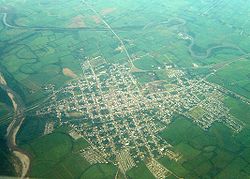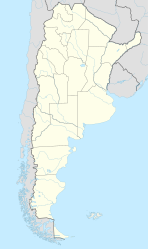Monteros
| Monteros | |
|---|---|
| Town | |

Aerial view of Monteros
|
|
| Location of Monteros in Argentina | |
| Coordinates: 27°10′S 65°30′W / 27.167°S 65.500°WCoordinates: 27°10′S 65°30′W / 27.167°S 65.500°W | |
| Country | Argentina |
| Province | Tucumán |
| Department | Monteros |
| Population | |
| • Total | 23,771 |
| Time zone | ART (UTC-3) |
| CPA base | T4142 |
| Dialing code | +54 3863 |
Monteros is a town in Tucumán Province, Argentina, located 58 km (36 mi) south-west of the provincial capital San Miguel de Tucumán, and which lies at an altitude of 532 m (1,745 ft). It has 23,771 inhabitants according to the 2001 census [INDEC], and is the head town of the Monteros Department. Surrounded by four rivers, the average temperature is 35 °C (95 °F) in summer and 10 °C (50 °F) in winter with highs and lows of 45 °C (113 °F) and −3 °C (27 °F).
It was founded on August 28, 1754 when the military governor Don Felipe Antonio de Alurralde took possession of the local lands over an existing village on the site. Though Monteros had been known as a little village years before. Monteros eventually acquired the rank of municipality on December 12, 1867 with its first mayor Don Domingo Segundo Aráoz. It has been one of the most renowned and prosperous towns from southern Tucumán due to its cultural, educative and commercial life.
There have been several versions about the origin of the town's name. One version suggests that some inhabitants of the old San Miguel de Tucumán, which used to be on a place currently known as Ibatín, refused to move to the new location and declared in rebellion, taking refuge in the nearby hills. The name may have derived from "people of the hill" (Monte in Spanish). Another version says that the remaining inhabitants of the old San Miguel de Tucumán founded Monteros on October 4, 1865, naming it the Town of the Holy Rosary of Monteros. There were three attempts to rename the town. In 1828 and 1832 Villa Belgrano was the name proposed, in honor of Manuel Belgrano but it did not succeed. The strangest case was in 1932 when the then provincial governor, Alejandro Heredia, attempted to rename it to Alexandria, in his own honor.
The main use of agriculture in the local economy is the sugar industry. The Ñuñorco plant (founded in 1926) is the main industrial plant in the town. The rural areas nearby the town are suited to growing sugar cane, lemons, blueberries and strawberries.
...
Wikipedia

